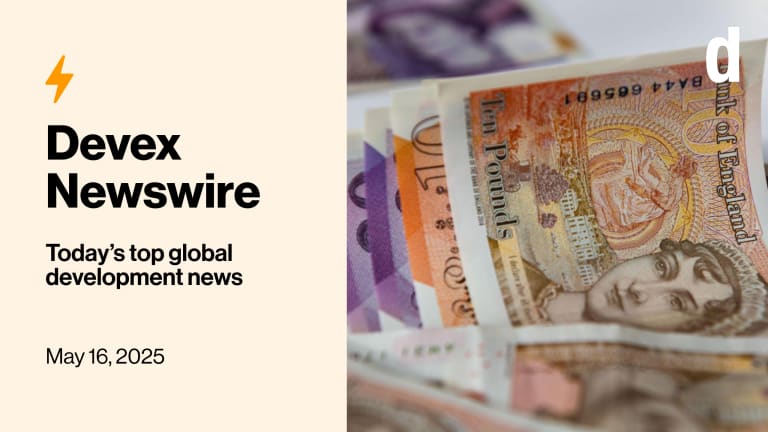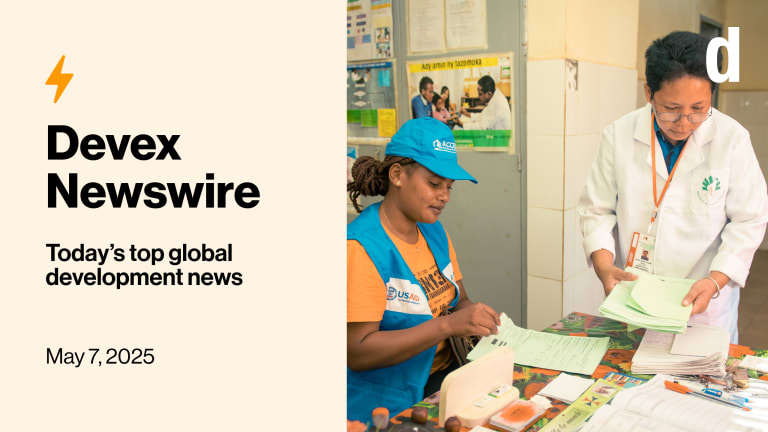Presented by The Scaling Community of Practice

U.K. aid has had an inordinate share of ups and downs over the last few years. We look at the plan for development if Labour takes the wheel.
Also in today’s edition: COVID-19 spawned a bevy of pandemic funds, but have these funds really prepared us for the next global health emergency?
This is a preview of Newswire
Sign up to this newsletter for an inside look at the biggest stories in global development, in your inbox daily.
Happening soon: China has emerged as one of the world’s biggest aid donors. Get expert insight into its strategy and spending in our event today at 10 a.m. ET (4 p.m. CET). Register now. Can’t attend live? Register anyway and we’ll send you a recording.
Duty of Keir
U.K. aid has been in freefall for years. Aid advocates are pinning their hopes on the Labour Party and its leader Keir Starmer, the widely expected winners of an election this year, to turn the downward spiral around.
But Lisa Nandy, who will be international development minister if her party prevails, said Labour would in fact gradually reduce the number of countries receiving U.K. aid if it takes power.
At first blush, it’s a disappointing turn of events for development observers, but the stated aim of these cuts is actually to return spending to its “original purpose of eliminating global poverty.”
“We will never pull out the rug from under countries that rely on us,” she insisted at a London think tank event. Rather, Labour would pursue “a more strategic approach” to zero in on tackling extreme poverty.
According to Nandy, rising indebtedness and the need to mitigate the threat from climate change meant aid money had been “diverted to middle-income countries simply to help them stand still.”
“We want to get to the point where we're able to spend our aid money on the poorest people, in the poorest countries in the world. That's what it was always intended to do, and increasingly it isn't,” she told Devex U.K. Correspondent Rob Merrick.
The shadow minister also called debt restructuring “the single biggest thing we can do” to help low-income nations — hinting that Labour will extend the use of loan guarantees to bring down the cost of borrowing.
The party is still considering whether to restore a separate aid department — after the abolition of the Department for International Development in 2020 — or opt instead for an independent agency within the Foreign Commonwealth & Development Office.
On the topic of Labour’s plans, Rob hosted a Devex Pro Live event on U.K. aid last week where he was joined by Romilly Greenhill, chief executive officer of Bond, and Ian Mitchell of the Center for Global Development.
The good news, the experts agreed, is that Labour is being more open about its vision. Greenhill was also encouraged that Nandy has singled out the global debt crisis and programs for women and girls as key challenges. “I think we're starting to really see the shape of Labour’s development offer,” she said.
But Labour has been conspicuously silent on when, or even if, it would return to spending 0.7% of gross national income on aid — after the 2020 cut to 0.5%.
“We can't do this without money. We do need to be thinking in the long run about how we increase the ODA budget. We're not there yet — we don't have very strong commitments,” Romilly warned.
Read: Labour vows to cut number of countries receiving UK aid (Pro)
Watch: Do Labour’s plans for UK aid stack up? (Pro)
+ A Devex Pro membership gives you access to all our expert analyses, insider insights, exclusive events, and more. Not a Pro member yet? Start your 15-day free trial today.
British whiplash
So what commitments have been made under the Conservative Party? Devex’s Alecsondra Kieren Si analyzed the numbers and found that over £6.3 billion was spent on development-related contracts over the past decade, with the same small pool of contractors consistently vying for the highest amount.
It was still a rollercoaster ride though, with sharp fluctuations in the amount of business to bid for. From the middle until the end of the last decade, the value of contracts rose dramatically, peaking in the fiscal year ending March 2019, before falling off a cliff the year after.
With Labour likely to take the reins, however, development spending is expected to increase once again, and this is reflected in the most recent figures — which are back into the billions.
Read: How FCDO development contracts changed over a decade (Pro)
+ For more practical business development and resource mobilization advice, including funding insights, sign up to Money Matters.
A pandemic glut, or gap?
Have we got another uncontrolled outbreak — but this time, a case of the funds?
Of course, if a new pandemic hits, we probably won’t be joking about having too many funds. Still, it’s not clear that in this case the more equals the merrier.
There’s the aptly named Pandemic Fund, which is housed at the World Bank and was set up in 2022 with a broad mandate. The World Bank also had the Pandemic Emergency Financing Facility, known as PEF, designed to provide countries with additional resources to respond to large-scale outbreaks. The ongoing talks in Geneva over a pandemic treaty also include discussions around setting up a new pandemic financing mechanism.
Yet each has its flaws and offers a piecemeal approach. In fact, there’s a huge gap in the global system for prearranged finance for outbreak response, says Cristina Stefan of the U.K.-based Centre for Disaster Protection. But instead of adding yet another fund to the mix, she says what we already have could be expanded and scaled.
“We shouldn't be reinventing the wheel at all costs. There'll be things that we can still keep from the existing system and that are actually worth improving, instead of just bringing a new shiny silver bullet for the next pandemic,” she tells my colleague Jenny Lei Ravelo.
“Funds are not unlimited. … At the end of the day, the same budget lines are competing,” she points out.
Read: Is a new fund really the answer to the next pandemic? (Pro)
+ Been reading our news? Test your knowledge of some of the past month's impactful globaldev stories by taking our quiz!
Gaza lifeline
The European Union has offered a sliver of hope to the beleaguered, near-bankrupt, but still integral U.N. aid agency in Gaza by releasing funding thrown into doubt by Israeli claims of staff involvement in the Hamas’ Oct. 7 massacre.
Last month the head of UNRWA, the U.N.’s lead agency helping Palestinians, warned it would run out of money unless an “absolutely critical” €82 million ($88.8 million) EU payment was made.
Brussels appointed its own experts to examine the allegations — while criticizing Israel for failing to provide any proof of guilt — but will now release €50 million of the €82 million before the audit is completed, Rob tells me.
Two further tranches of €16 million will be released when UNRWA implements an agreement to conduct its own review of its staff’s actions and to strengthen its “department of internal investigations.”
A no-doubt relieved Philippe Lazzarini, UNRWA’s commissioner-general, says the payment would ensure the delivery of “lifesaving and essential services.” Funding from the United States, United Kingdom, and many individual European donors remains frozen.
The EU also announced a further €68 million of aid to be distributed through the Red Cross and the Red Crescent. “We stand by the Palestinian people in Gaza and elsewhere in the region. Innocent Palestinians should not have to pay the price for the crimes of terrorist group Hamas,” says European Commission President Ursula von der Leyen.
ICYMI: USAID announces funding for Gaza — but not UNRWA
Opinion corner
• Several blended finance megatransactions have taken place in quick succession — any one of which could potentially spell huge change for climate finance, writes Joan Larrea.
• Multilateral development banks are already tackling urban climate finance challenges, but there are more ways they can bolster cities’ potential to adapt to climate change, argue Elena Bagnera and Priscilla Negreiros.
• Brief moments of hope for economic development had gripped politically kleptocratic Guinea in the past two decades when a select group of companies arrived to not only invest in extraction projects but also fund a range of commercial and civil infrastructure. However, Guineans’ ambition for meaningful, sustained development has all too often been dashed by mismanagement and corruption, writes former BBC Africa Bureau Chief Peter Burdin.
In other news
U.S. Vice President Kamala Harris called on the Israeli government to increase the flow of aid to Gaza, and on Hamas to accept a deal for a six-week cease-fire. [Reuters]
Tunisian civil society groups are concerned that its government intends to cut off foreign funding under the guise of combating money laundering and terrorism. [France 24]
U.N. Secretary-General António Guterres said small island developing states should have quick and easy access to climate finance through the Loss and Damage Fund. [UN News]
Sign up to Newswire for an inside look at the biggest stories in global development.




